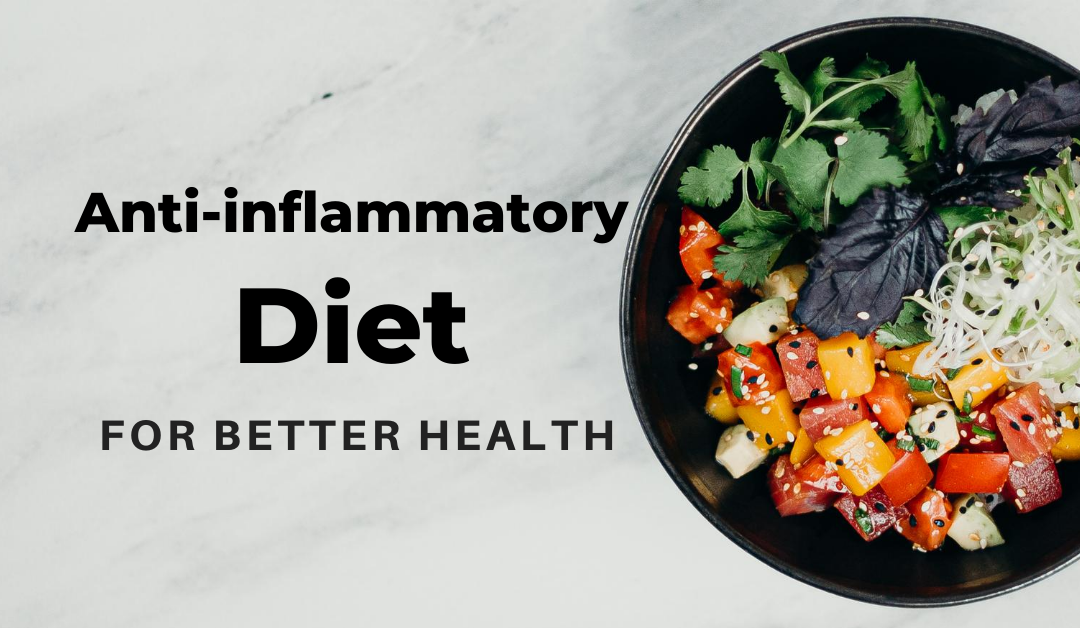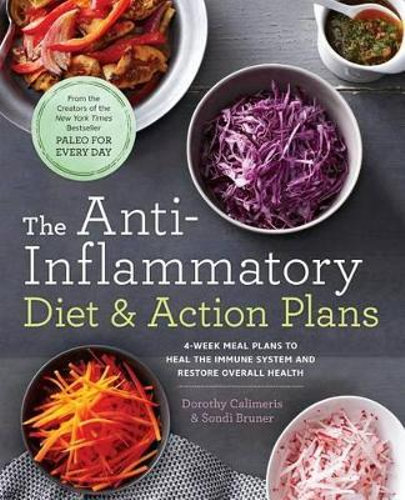What is an Anti Inflammatory Diet?
Inflammation can lead to many problems in your body, which is why it’s important to keep it under control with an anti inflammatory diet plan. Inflammation can contribute to diseases like arthritis, Alzheimer’s, diabetes, depression, heart disease, and even cancer. An anti inflammatory diet meal plan can help stabilise blood sugar and increase metabolism, while also helping you lose weight.
Studies have show that a build up of oxidative stress may be the ‘trigger’ for conditions that cause inflammation, therefore it may help to change your eating habits.
While treatments and medication are important, many health professionals recommend adopting an anti-inflammatory diet may help, too. If you have, say, rheumatoid arthritis, changing what’s on your plate won’t be a ‘magic’ cure – however it might lessen the number of flare-ups that you have, or it may help take your pain levels down a few notches.
What to Eat?
Since food plays an important role in fighting inflammation, it’s crucial to recognise anti inflammatory diet foods so you can fill your fridge and cupboard with them. They include foods like tomatoes, leafy green vegetables (spinach, kale), fatty fish (salmon, tuna), cultured foods (kimchi and pickled veggies) nuts, extra virgin olive oil, avocado and coconut oil, and fruits like blueberries, strawberries and cherries. If you want to lower inflammation, you need to cut out processed foods and increase your intake of natural foods.
Veggies and fruit: Go for variety and lots of colour. Research has shown that vitamin K-rich leafy greens like spinach and kale help reduce inflammation, as does broccoli and cabbage. Interestingly also the substance that gives fruits like blackberries, cherries and raspberries their colour is a type of pigment that also helps fight inflammation.
Whole grains: Oatmeal, brown rice, whole-wheat bread, and other unrefined grains tend to be high in fiber, and fiber also may help with inflammation.
Beans: They’re high in fibre, plus they’re loaded with antioxidants and other anti-inflammatory substances.
Nuts: They have a healthy kind of fat that helps stop inflammation. (Avocados and olive oil are also good sources.) Limit these to just a handful of nuts a day; otherwise, the calories and fat will stack up.
Fish: Put it on your plate at least twice a week. Salmon, tuna, and sardines all have plenty of omega-3 fatty acids, which fight inflammation.
Herbs and spices: They add antioxidants (along with flavour) to your food. Turmeric, found in curry powder, has a strong substance called curcumin. And garlic curbs the body’s ability to make things that boost inflammation.
What Not to Eat
If you have inflammation, avoid anything overly greasy, super sweet or highly processed.
Sweets, cakes and cookies, and soda: They’re not dense in nutrients, and they’re easy to overeat, which can lead to weight gain, high blood sugar, and high cholesterol (all related to inflammation). Sugar causes the body to release inflammatory messengers called cytokines. Soda and other sweet drinks are main culprits. Anti-inflammatory nutritional experts often say you should cut out all added sugars, including agave and honey.
High-fat and processed red meat (like hot dogs or salami): These have a lot of saturated fat, which can cause inflammation if you get more than a small amount each day.
Butter, whole milk, and cheese: Again, the problem is saturated fat. Instead, eat low-fat dairy products. They’re not considered inflammatory.
French fries, fried chicken, and other fried foods: Cooking them in vegetable oil doesn’t make them healthy. Corn, safflower, and other vegetable oils all have omega-6 fatty acids. You need some omega-6s, but if you get too much, as most Americans do, you throw off the balance between omega-6s and omega-3s in your body and end up with — you guessed it — more inflammation.
Coffee creamers, margarine, and anything else with trans fats: Trans fats (look on the label for “partially hydrogenated oils”) raise LDL cholesterol, which causes inflammation. There’s no safe amount to eat, so steer clear.
Wheat, rye, and barley: The focus here is gluten, and this one’s a controversial maybe. People who have celiac disease need to avoid gluten. But for everyone else, the science is solid that whole grains are beneficial.
WebMD Medical Reference ~ Kathleen M. Zelman, MPH, RD, LD
Protect your body from agitating foods: the anti-inflammatory diet and action plan
A 4-Week Meal Plans to Heal the Immune System and Restore Overall Health – recommended book
So much in life is beyond our control. Managing chronic inflammation and pain doesn’t have to be. From the publishers who brought you the New York Times bestseller Paleo for Every Day, comes the most complete meal plan and cookbook for fighting inflammation through the power of food and nutrition. With The Anti Inflammatory Diet and Action Plans you will reduce inflammation naturally, and heal the conditions that frequently occur as a result, such as arthritis, autoimmune conditions, food allergies, gastrointestinal distress, and more.
The Anti Inflammatory Diet and Action Plans makes inflammation a thing of the past by offering:
- Over 130 delicious, easy-prep recipes that feature affordable ingredients, minimal prep time, and hundreds of useful tips
- 4 flexible anti inflammatory diet plans to fit your needs and tastes, including choices for Vegan, Paleo, Mediterranean, and Time-Saving diets
- Knowledgeable guidance from food writer and healthy eating expert, Dorothy Calimeris, as well as holistic nutritionist and food blogger, Sondi Bruner
- Helpful food lists and nutritional information will help you make smart food choices and stick to your anti inflammatory diet
Prepare to cook your way toward better health with The Anti Inflammatory Diet and Action Plans. Your personalized anti inflammatory diet is waiting.
* These statements have not been evaluated by the Food and Drug Administration. This product is not intended to diagnose, treat, cure, or prevent disease.*
About the Author


